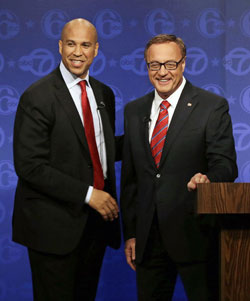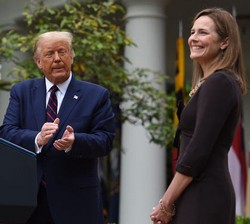Senator Bernie Sanders introduced his “Medicare for All” bill on September 13th and plans to go state-to-state in order to promote his bill—his first stop was in San Francisco at the “California Nurses Convention” on Sept. 22.
In 1965, then-President Johnson established the Medicare program in order to provide healthcare to Americans 65-and-older. Eligibility for the program’s benefits was extended to Americans with certain disabilities in 1972. The program provides a variety of covered medical treatments at certain prices, and subsequently reimburses doctors and hospitals whenever a beneficiary uses those services.
The Medicare “trust-fund” is dependent on its enrollment, and how many medical services recipients use. Sanders hopes to significantly increase the program’s enrollment by expanding it to every American, which would render most Affordable Care Act (ACA) exchanges obsolete.
According to Sanders, his plan would eventually lower prices of healthcare because of the single-payer system’s simplicity. However, getting subsidy for the program would require reducing doctors’ salaries and/or the number of professionals in hospitals, as well as eliminating some medical treatments that are currently offered. Sanders also suggests cutting spending in pharmaceuticals to save expenses. However, doing so could potentially limit access to new, and otherwise expensive, treatments—as well as reduce investments in new technologies. Moreover, “the perks of staying in an American hospital, such as having a private patient room” could be jeopardized—the Times reports.
Many countries have single-payer healthcare systems, yet all of them pay substantially less for healthcare than the U.S. would. This is because Sanders’ plan would cover extensively more than usual insurance plans do in both the U.S. and abroad. According to research from The Urban Institute, Sanders’ healthcare plan would cost double than what his 2016 campaign initially estimated.
Sanders’ plan removes premiums, deductibles, and most other co-pays for medical care. Additionally, he plans to cover services such as dentistry, optometry, and long-term nursing home stays—all which sounds appealing, but would ultimately add to the cost.
“I have been a nurse for 41 years,” Dr. Jannone, a Monmouth-professor, said, “I know there is disparity of care in our country. The system we have now is not working. Medicare works for the elderly if they have a supplement plan. The Affordable Care Act is not perfect and it works better in some states [than it does in others.]”
Jannone believes everyone should have access to healthcare, regardless of his/her income. “Healthcare must be recognized as a right, not a privilege,” she said, “I am just unsure how we can fund his plan.” Funding his plan, Sanders proposes hiking rates on payroll and income taxes, and on some corporate taxes.
Another unsavory consequence of Sanders’ single-payer would be cuts to healthcare providers’ paychecks, in order to operate similarly to those abroad. The Organization for Economic Cooperation and Development has found that doctors in the U.S. make substantially higher incomes than any other developed country.
For example, according to the Medscape Physician Compensation Report, the average family physician in the U.S. earns $207,000 where as those in Britain earn about $130,000. The pay-gap is even more disparate amongst specialists, such as cardiologists and orthopedists. Moreover, making such salary deductions to doctors could bring them to default on their mortgages and student-loans, according to the New York Times.
Progressives are not being progressive by insisting on immediate transferal to single-payer; they’re being precipitous, and many Democrats are against such a bill. In an interview with The Washington Post, House-Minority-Leader, Nancy Pelosi, said that single-payer healthcare is not a litmus test for Democrats. Additionally, she is “focused on protecting health-care coverage under the Affordable Care Act.”
Pelosi recommends Democrats propose broader solutions to improve former-President Obama’s plan—the eponymous “Obama-care”—and have them analyzed by budget scorekeepers.
Bernie Sanders has undoubtedly galvanized left-wing factions within the Democratic Party, particularly amongst young-voters. However, not all millennials are on-board with Bernie’s agenda. “It just seems too unstable,” Alexis Borrino, a primary-education-major, said, “It would take years to really accomplish [universal coverage], and Bernie wants to just do it at once.” Borrino also worries about the substantial tax-hikes and surcharges needed to fund Bernie’s plan.
Sanders’ ideologies have also garnered much criticism from Democrats. Among them, 2016 Presidential-candidate, Hillary Clinton. She believes there’s a wedge within the Democratic Party over “reality” and Bernie’s “impractical proposals”.
“He is not a Democrat,” Clinton said in her book, What Happened, “And that’s not a slam on him; it’s just a repetition of what he says about himself.” In an interview with Ezra Klein, Clinton stated, “It’s going to be challenging if, within that bill, there are tax increases equivalent to what it would take for single-payer, and if you’re telling Americans they can no longer have the policies they have through their employer.”
Clinton explained Vermont’s effort to pass a single-payer plan: “This is in, you know, a small state, where it might’ve been possible. They were talking about an increase in the payroll tax [by 11.5%], they were talking about a sliding income scale—it was just so difficult to put pieces together.”
Nonetheless, 15 Democrats—among them, prospective 2020 presidential-candidates, Senators Kamala Harris and Elizabeth Warren—have co-sponsored Sanders’ bill.
Dr. Gonzalez, a Monmouth-professor, explains the ethics surrounding single-payer: “From the vantage point of utilitarian ethics, we would want a healthcare system that maximizes [overall] benefits for the greatest number,” he says, “My understanding of social science is that single-payer would do just that.”
“There will always be some level of sacrifice…and that’s OK. [For example,] I want my neighbors’ kids to receive a good education…So I pay the school tax,” Gonzalez says.
The American healthcare system has become subject to having to decide between quality or quantity; and if Congress cannot pass bi-partisan healthcare solutions, that decision becomes more imminent. But this doesn’t have to be the fate of our healthcare system.
Modest increments of expansion, such as lowering the age to enroll in Medicare and revising eligibility for Medicaid, would progressively achieve universal-coverage for Americans.
A streamline of revenue to Medicare already exists through a 2.9% payroll-tax, shared by individuals and their employer. A shift of 2.1% from the Social Security payroll-tax into the Medicare payroll-tax, and introducing a public-option to those 55-and-older to buy into the program, would increase revenue and therefore bring down cost-sharing prices for those currently enrolled—while ensuring the program’s success for future-generations.
Expanding Medicare’s market, to live in unison with the private-sector, would provide more customizable plans with lower prices and greater benefits; encourage innovation in treatments and delivery-systems; prevent hospital monopolies from overcharging private-insurers; and protect the elderly and the disabled from predatory price-gouging by insurance-companies.
Additionally, improving the ACA is imperative: uphold the pre-existing conditions sanction; but eliminate the federal-mandate for individuals and employers to purchase healthcare, to remedy financial burdens affecting middle-income families and small businesses.
Pope Francis criticized President Trump on his decision to reverse President Obama’s Deferred Action for Children Program, or DACA, on a flight returning to Rome from a five-day visit to Colombia on Sept. 10.
“The President of the United States presents himself as pro-life and if he is a good pro-lifer, he understands that family is the cradle of life and its unity must be protected,” Francis said, according to CNN.
The pope appealed to Trump during a news conference aboard the papal plane on Sunday, speaking to reporters in a question-and-answer fashion.
Pope Francis also included, along with his passage from the psalms about man’s stubbornness, the issue of climate change and the danger of denying the phenomenon, reported The New York Times:
“Man is stupid, the Bible said,” Francis said, “It’s like that, when you don’t want to see, you don’t see.”
The pope’s consideration of Trump’s policies follows a previous criticism, in which he gave Trump a copy of his 2015 “Laudato Si,” which pushed the importance of a global effort to curb climate change – this act demonstrated the necessity of the United States not to withdraw from the Paris climate accord.
The importance of Pope Francis’ involvement in President Trump’s policies is dimensional. Some argue that a separation between church and state remains at the forefront of American consideration of politics. Others find that the issue is more complicated.
Professor Ryan Tetro of the Political Science department argues that the pope’s commitment to certain values significantly affects a large portion of the American people: “Despite the First Amendment’s Establishment Clause, much of our law is grounded in Judeo-Christian values. It is significant any time the Pope speaks on a political issue because about 20% of the U.S. population is Catholic.”
On the idea that the pope was criticizing Trump as a person, Tetro said, “I don’t think the Pope is attacking President Trump’s character but rather sticking to the Vatican’s consistent position regarding the significance of family.
Tetro also provides important insight into the news conference. He said, “The Vatican and Trump got off to a rocky start but if you read the entirety of the Pope’s response to the question presented, he admits he does not know enough about the DACA legislation to provide full comment but instead provides a blanket response about the need to protect and defend the unity of family.”
“Pope Francis is more caring and compassionate,” R’reanna Hester, a junior Communication student at Monmouth, said when asked to compare the two in light of the DACA decision..
Dr. Stephen Chapman, assistant professor and Direction of MA Public Policy Program in the Political Science Department, contends that the DACA decision will affect many young people, including college students.
“I would contend that the implications for DACA on college students will be quite varied,” Chapman said. “Obviously, the students directly impacted by the action will be most affected. These are the students who came to this country as children and are looking to advance their position in society, either through education or military service.
The Dreamers who will inevitably be affected by the decision are currently experiencing a lot of insecurity in their future. “Given the recent actions by President Trump, their future educational and career plans are uncertain,” Chapman said.
Chapman also considers the fact that Trump’s intentions will be discussed politically, minimally, or not at all. “Aside from those directly affected, I would imagine that the DACA issue will spark vigorous conversations from students on both sides of the political aisle,” he said.
“Issues relating to immigration, security, and the fundamental principles of this country will be salient issues for many students.”
“Of course, there will be a large portion of the student body that hold little information about the subject and may not even care too deeply about either side. This is not to say college students do not know or care about political issues; the same could be said for much of the electorate.”
IMAGE TAKEN from theguardian.com



